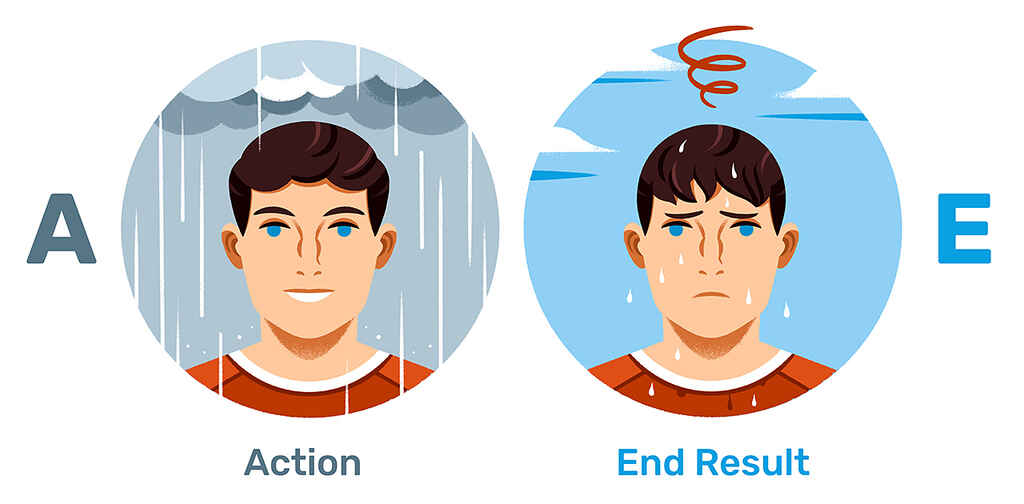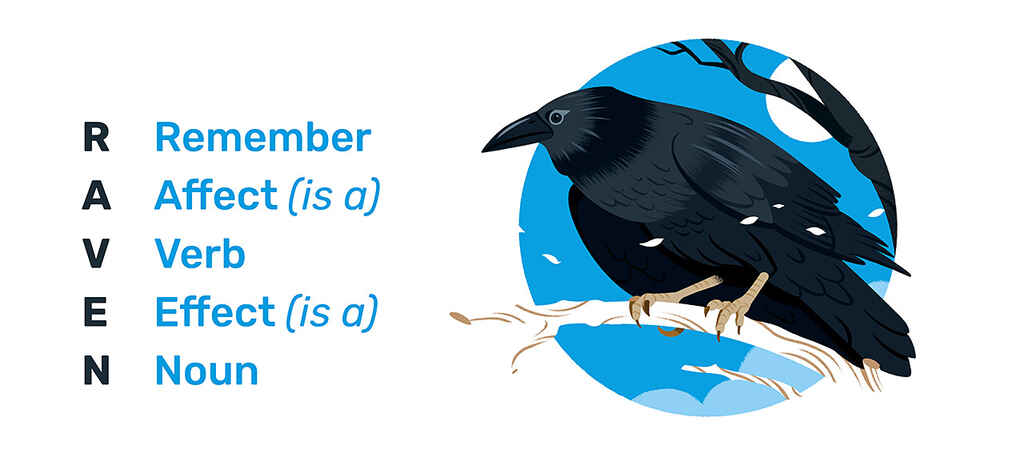/ Apr 28, 2025
Trending
Affect is usually a verbthat means “to create a change” in something, while effect is usually a noun that describes “a change that is caused” by something. In other words, an affect produces an effect.
Even if you’re a card-carrying member of the grammar police, the words affect and effect are easily confused. To clear the haze, this post will help you lock in the meaning of these two words with a few simple memory tricks!
First of all, let’s look up the most common dictionary definitions and see if they can affect your ability to remember what the word means!
To affect is to produce a physical effect or change through action. For example:
It can be to produce a mental effect or move someone’s emotions. For instance:
Affecting can mean pretending to be feeling or thinking something.
To put a fine point on it, ‘affect’ is usually something that happens to the subject or object of a sentence.
For some highbrow context, let’s take this quotation from Virginia Woolf’s To The Lighthouse:
‘Let us enjoy what we do enjoy,’ he said. His integrity seemed to Mrs Ramsay quite admirable. He never seemed for a moment to think, But how does this affect me?
— Virginia Woolf, To The Lighthouse.
In contrast, the speaker in this excerpt is assuring us that their emotional state is not ‘affected’ negatively or positively:
“I do assure you, that the news does not affect me either with pleasure or pain. I am glad of one thing, that he comes alone; because we shall see the less of him. Not that I am afraid of myself, but I dread other people’s remarks.”
— Jane Austen, Pride and Prejudice.
If you mistake the meaning of certain words, it can have a detrimental effect on people’s ability to understand what you mean. With that in mind, let’s hit some quick definitions:
An effect is a change brought on by a cause or event.
It can also be the result of an action.
In Orwell’s classic dystopian novel, the narrator describes how a changing (or intoxicating) effect is caused by the wine — or should be, was it not “disappointing.”
“For some reason he had always thought of wine as having an intensely sweet taste, like that of blackberry jam and an immediate intoxicating effect. Actually, when he came to swallow it, the stuff was distinctly disappointing.”
— George Orwell, Nineteen Eighty-Four.
Whereas in this excerpt from Lord of The Rings, we can see that the action of being stabbed resulted in Frodo finding his sense of perception is stronger than ever.
“Though he had been healed in Rivendell of the knife-stroke, that grim wound had not been without effect. His senses were sharper and more aware of things that could not be seen.”
— J. R. R. Tolkein, Lord of the Rings.
Now that we know what affect and effect both mean, let’s find a way to never mix them up again.
We’ve found that the ultimate solution to getting their differences memorized permanently is to find and use simple mnemonics — hooks that let us visualize something we want to remember. So try one of these on for size:
A(ffect) is for Action; E(ffect) is for End result.

Remember: Affect is a Verb and Effect is a Noun

A&E: When you’re Affected by an Accident, the Effect is an Emergency.

With these tricks in your back pocket, you’ll never again mistake these two words. Well, almost never — as we’re about to discover.
Just as the “I before E except after C” trick doesn’t apply to words like freight and sleight — there are exceptions to the affect/effect rule. You may be disappointed to hear that sometimes:
These forms of affect and effect are certainly less common than the definitions used above, but they’re still worth knowing.
An affect can be the physical manifestation of an emotion (e.g., a facial expression).
It can also be a conscious set of feelings caused by a thought or event.
Note: When used as a noun, the word affect often takes on a different pronunciation. The emphasis is on the first syllable (AFF-ect) — as in “the actor, Ben Affleck.”
To effect is to bring something into being.
It can also mean accomplishing something, often overcoming obstacles.
Though, as we mentioned earlier, these usages of affect and effect are rather rare and will likely only pop up in more formal styles of speech and writing.
Affect is usually a verbthat means “to create a change” in something, while effect is usually a noun that describes “a change that is caused” by something. In other words, an affect produces an effect.
Even if you’re a card-carrying member of the grammar police, the words affect and effect are easily confused. To clear the haze, this post will help you lock in the meaning of these two words with a few simple memory tricks!
First of all, let’s look up the most common dictionary definitions and see if they can affect your ability to remember what the word means!
To affect is to produce a physical effect or change through action. For example:
It can be to produce a mental effect or move someone’s emotions. For instance:
Affecting can mean pretending to be feeling or thinking something.
To put a fine point on it, ‘affect’ is usually something that happens to the subject or object of a sentence.
For some highbrow context, let’s take this quotation from Virginia Woolf’s To The Lighthouse:
‘Let us enjoy what we do enjoy,’ he said. His integrity seemed to Mrs Ramsay quite admirable. He never seemed for a moment to think, But how does this affect me?
— Virginia Woolf, To The Lighthouse.
In contrast, the speaker in this excerpt is assuring us that their emotional state is not ‘affected’ negatively or positively:
“I do assure you, that the news does not affect me either with pleasure or pain. I am glad of one thing, that he comes alone; because we shall see the less of him. Not that I am afraid of myself, but I dread other people’s remarks.”
— Jane Austen, Pride and Prejudice.
If you mistake the meaning of certain words, it can have a detrimental effect on people’s ability to understand what you mean. With that in mind, let’s hit some quick definitions:
An effect is a change brought on by a cause or event.
It can also be the result of an action.
In Orwell’s classic dystopian novel, the narrator describes how a changing (or intoxicating) effect is caused by the wine — or should be, was it not “disappointing.”
“For some reason he had always thought of wine as having an intensely sweet taste, like that of blackberry jam and an immediate intoxicating effect. Actually, when he came to swallow it, the stuff was distinctly disappointing.”
— George Orwell, Nineteen Eighty-Four.
Whereas in this excerpt from Lord of The Rings, we can see that the action of being stabbed resulted in Frodo finding his sense of perception is stronger than ever.
“Though he had been healed in Rivendell of the knife-stroke, that grim wound had not been without effect. His senses were sharper and more aware of things that could not be seen.”
— J. R. R. Tolkein, Lord of the Rings.
Now that we know what affect and effect both mean, let’s find a way to never mix them up again.
We’ve found that the ultimate solution to getting their differences memorized permanently is to find and use simple mnemonics — hooks that let us visualize something we want to remember. So try one of these on for size:
A(ffect) is for Action; E(ffect) is for End result.

Remember: Affect is a Verb and Effect is a Noun

A&E: When you’re Affected by an Accident, the Effect is an Emergency.

With these tricks in your back pocket, you’ll never again mistake these two words. Well, almost never — as we’re about to discover.
Just as the “I before E except after C” trick doesn’t apply to words like freight and sleight — there are exceptions to the affect/effect rule. You may be disappointed to hear that sometimes:
These forms of affect and effect are certainly less common than the definitions used above, but they’re still worth knowing.
An affect can be the physical manifestation of an emotion (e.g., a facial expression).
It can also be a conscious set of feelings caused by a thought or event.
Note: When used as a noun, the word affect often takes on a different pronunciation. The emphasis is on the first syllable (AFF-ect) — as in “the actor, Ben Affleck.”
To effect is to bring something into being.
It can also mean accomplishing something, often overcoming obstacles.
Though, as we mentioned earlier, these usages of affect and effect are rather rare and will likely only pop up in more formal styles of speech and writing.
It is a long established fact that a reader will be distracted by the readable content of a page when looking at its layout. The point of using Lorem Ipsum is that it has a more-or-less normal distribution of letters, as opposed to using ‘Content here, content here’, making it look like readable English. Many desktop publishing packages and web page editors now use Lorem Ipsum as their default model text, and a search for ‘lorem ipsum’ will uncover many web sites still in their infancy.
It is a long established fact that a reader will be distracted by the readable content of a page when looking at its layout. The point of using Lorem Ipsum is that it has a more-or-less normal distribution of letters, as opposed to using ‘Content here, content here’, making it look like readable English. Many desktop publishing packages and web page editors now use Lorem Ipsum as their default model text, and a search for ‘lorem ipsum’ will uncover many web sites still in their infancy.
The point of using Lorem Ipsum is that it has a more-or-less normal distribution of letters, as opposed to using ‘Content here, content here’, making

The point of using Lorem Ipsum is that it has a more-or-less normal distribution of letters, as opposed to using ‘Content here, content here’, making it look like readable English. Many desktop publishing packages and web page editors now use Lorem Ipsum as their default model text, and a search for ‘lorem ipsum’ will uncover many web sites still in their infancy.
It is a long established fact that a reader will be distracted by the readable content of a page when looking at its layout. The point of using Lorem Ipsum is that it has a more-or-less normal distribution
Copyright BlazeThemes. 2023